Compliance Issues Continue to Plague the Suwannee Valley Transit Authority: Following the law and its own rules continues to be problematic
Posted August 11, 2021 05:30 pm
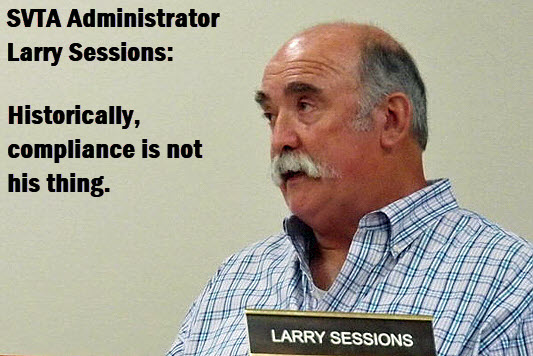
SVTA Administrator Larry Sessions explained
merrit raises were "personal." (Columbis
County Observer photo and graphic)
220x178_P5133931.jpg) COLUMBIA, HAMILTON, SUWANNEE COUNTIES, FL – Monday
night, the Board of the Suwannee Valley Transit
Authority (SVTA or the Authority) met in the Suwannee
County Courthouse Annex and approved its FY2022 annual
budget during the Authority’s quarterly meeting.
COLUMBIA, HAMILTON, SUWANNEE COUNTIES, FL – Monday
night, the Board of the Suwannee Valley Transit
Authority (SVTA or the Authority) met in the Suwannee
County Courthouse Annex and approved its FY2022 annual
budget during the Authority’s quarterly meeting.
The Suwannee Valley Transit Authority is a dependent special district serving Columbia, Hamilton, and Suwannee Counties. Its Board is composed of two commissioners from each of the member counties.
The SVTA is governed by a tri-county interlocal agreement and the Florida Statutes.
The Authority is advised by the North Central Florida Regional Planning Council and overseen by the Florida Department of Transportation.
Links:
• More
SVTA articles
On Monday night, Columbia County Commissioners Rocky Ford and Toby Witt, Suwannee County Commissioners Don Hale and Travis Land, and Hamilton County Commissioner Robert Brown approved the Suwannee Valley Transit Authority FY2022 annual budget, as well as the FY2020 annual audit.
The SVTA Board, all County Commissioners, broke the law by failing to approve the budget by resolution and violated their own interlocal agreement by missing the 60-day budget approval deadline.
County Commissioners take an oath of office in which they swear to uphold the law.
Powell & Jones, the SVTA auditor, caught none of the mistakes – or looked the other way.
The Annual Audit
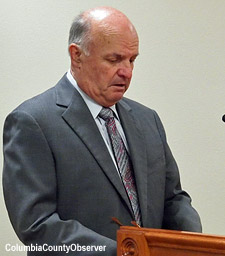
Richard Powell of Powell & Jones presents the audit on
Monday night.
The evening began with North Florida’s ‘go-to’ auditor Richard Powell of Powell & Jones, the Transit Authority’s outside Auditor, stepping up to the microphone to present the FY 2020 audit.
As usual, he found nothing wrong, but “stuff” was wrong – important stuff that Mr. Powell missed or hasn't acknowledged for years.
On page 39 of the audit, Mr. Powell wrote: "Prior to September 30, the administrator submits to the Board of Directors a proposed operating budget" for the next fiscal year commencing in October. (It commences less than 60 days away, on October 1).
Mr. Powell continued, "Public hearings are conducted following preliminary examination and revision of the proposed operating budget by the Board.”
Fact: The Suwannee Valley Transit Authority does not hold public hearings on its budget, nor is there any law that requires it to do so.
Mr. Powell continued, "After public hearings and necessary revisions have been completed, the budget is approved," and, "the legal level of budgetary control is the fund level." “Formal budgetary integration is employed as a management control device during the year for the General Fund.”
Fact: The Suwannee Valley Transit Authority budget does not show a “General Fund,” or any funds, nor has it for the years that Richard Powell has been doing the SVTA audits.
The Suwannee Valley Transit Authority Budget

The SVTA 2022 budget is here. It floats on $2.5
mil of public money.
The SVTA budget shows no breakout between administrative, driver, maintenance, or call center salaries.
During SVTA Administrator Sessions’ discussion about the budget, Mr. Sessions announced that it was “the first time in six years that I have been able to give the entire staff a cost of living raise. I have given a few merit raises.”
It appeared that Mr. Sessions was using CARES Act funding to give the across-the-board cost of living raise. The CARES Act does not provide that its funds be used for that purpose.
There was no budget supporting information for the Transit Authority Board, or the public.
Your reporter asked, “How many employees work for the Suwannee Valley Transit Authority?”
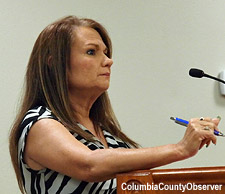
The SVTA's Cinda Foster explains the $15hr minimum wage.
It wasn't clear if Administrator Sessions knew the answer. Before he had a chance to speak, SVTA staff member "Cinda" Foster called out, "31."
The SVTA operates through grants, which earlier, Auditor Powell called “subsidies.”
Your reporter told the Board that he had requested the salary schedule from the Authority with a sample of a salary schedule previously received, and was told by the Authority that the salary schedule "didn't exist."
Your reporter told the Board that without any way to differentiate between administrative salaries, support and call-in salaries, and driver salaries, one couldn't figure out “what a ride costs. None of the information is here.”
Your reporter pointed out that the Authority didn’t mention how it is dealing with the $15hr state mandate, adding, "You don't know who got the merit raises. Where is that list, and how much did those people get?”
At the SVTA, Merit Raises Are “Personal”
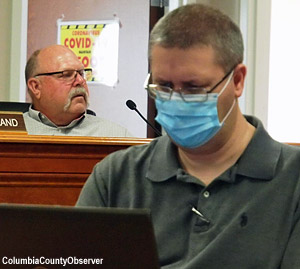
Commissioner Rocky Ford listens to Larry Sessions as
SVTA Clerk Eric Musgrove takes the minutes.
Administrator Sessions answered, “It’s a personal thing between me and the people that got the merit raises.”
Your reporter followed up, “I don't think it's personal, Mr. Sessions, because it's public money, and this is a public agency. It's not personal unless you are making a backroom deal with people... I don't know how one gets a personal relationship that enables them to get a raise.”
Administrator Sessions responded, “You got it all wrong, Mr. Lilker. When somebody does a good job that merits an increase, I bring them in with a witness in my office, and we discuss the reason they got the merit increase, and I show my appreciation with a raise.”
Your reporter asked, “Is anybody in Suwannee Valley Transit aware of what kind of merit raises employees are getting? If I ask for a list of the employees and the job description, and their salary and what kind of merit raise they got, the Suwannee Valley Transit Authority should be able to produce that, right?
SVTA Chairman Don Hale said, “I would think so.”
Mr. Sessions opined, “I would think so.”
Your reporter addressed Mr. Sessions, “You would think so? You would know.”
SVTA Board member Rocky Ford was examining the budget. Mr. Ford asked, “What is your annual payroll?”
Ms. Foster volunteered, “It usually runs about $32,000 a pay period.”
Mr. Sessions said, “We’re about $832,000 a year based on what she just said.”
Mr. Ford asked, “Is that in this budget?”
It wasn’t in the budget or any supporting information. The Suwannee Valley Transit Authority is run like a private club.
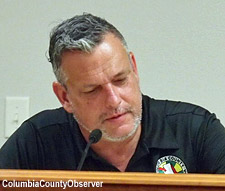
Commissioner Toby Witt approves of Mr. Sessions
performance.
The budget gives “total personnel expenses” as $1,230,209. Generally, benefits add an additional 35% to payroll. It is not clear how SVTA calculates benefits. Using the numbers provided at the Monday meeting, benefits are 55% of the "Total Personnel Expenses."
Commissioner Witt said he was happy with the way SVTA was being run and made a motion to approve the 2022 budget. It passed unanimously.
The Board Clerk, Eric Musgrove, asked for the amount of the budget. “Just for the record,” he said.
SVTA Administrator Sessions read out the amount of the budget, stating, “For the record.”
Fact: The Florida statute concerning Special Districts requires that the “governing body of each special district shall adopt a budget by resolution each fiscal year." (in law, shall = must)
The SVTA Board has six commissioners, two from Columbia, Hamilton, and Suwannee Counties. County budgets must be approved by resolution, yet not one of them asked why the Transit Authority budget was not being approved by a formal resolution, which must state the amount of the budget and other pertinent information.
The go-to auditor for North Florida, Richard Powell, knows that his governmental clients must pass and approve their budgets by formal resolutions. None of Richard Powell's audits or comments to the SVTA Board mentions that SVTA has violated the law.
Since 1976, the Tri-County-Interlocal Agreement between Columbia, Hamilton, and Suwannee Counties mandates, “The Administrator shall prepare and submit a proposed annual budget for the operation of said system at least sixty (60) days in advance of each fiscal year.”
The fiscal year begins on October 1.
Since Larry Sessions has been the administrator of the SVTA, he has not done this, something else auditor Richard Powell did not reveal.
Epilogue
Florida law requires that the SVTA Tri-County Interlocal Agreement be posted to the SVTA website. It is not.
Larry Sessions and the SVTA Board repeatedly demonstrate that the law does not restrain them from doing what they want to do – or not do.
Just before this article was published, the Observer heard from SVTA Board Chairman Don Hale. He was advised of the issues. He said, "I will inquire with the SVTA Attorney and Administrator Sessions to see if everythng was done correctly. Then I will get back with you."
